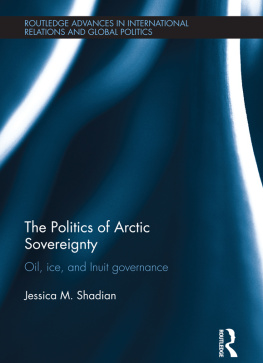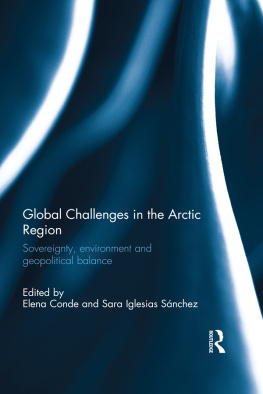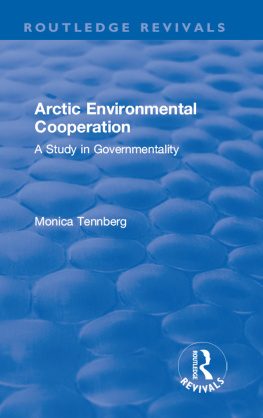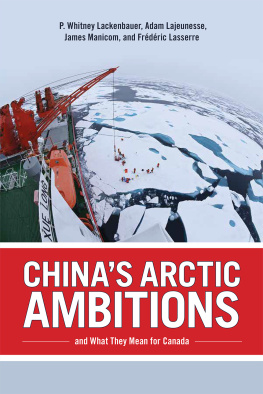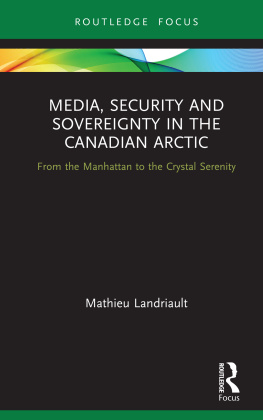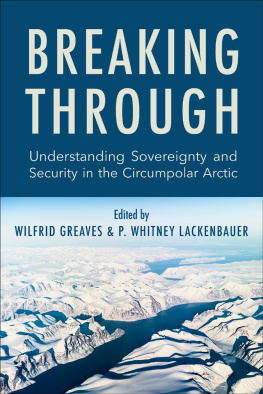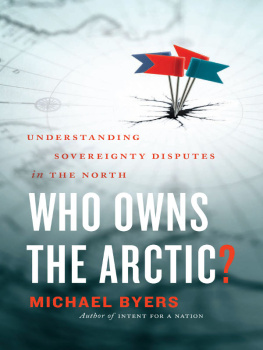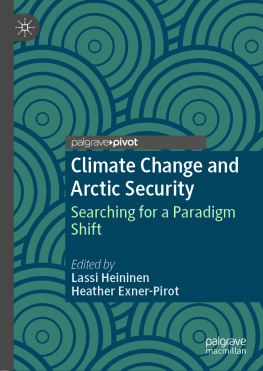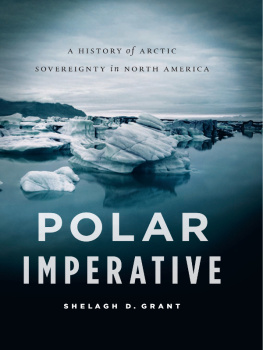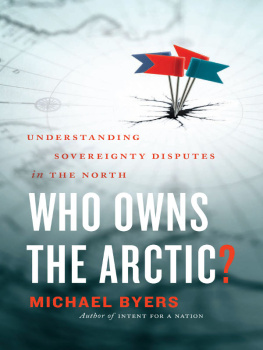
BREAKING THROUGH
Understanding Sovereignty and Security in the Circumpolar Arctic
Edited by Wilfrid Greaves and P. Whitney Lackenbauer
Globalization, climate change, and increased geopolitical competition are having a profound impact on the Arctic, affecting how we understand both sovereignty and security within the region. In Breaking Through, a diverse group of emerging and established scholars investigate Arctic sovereignty and security, rarely examined together, and present a theoretically robust study of Arctic sovereignty and security in both historical and contemporary contexts.
Throughout the volume, readers will discover fresh perspectives on under-studied dimensions of Arctic sovereignty, including environmental changes, foreign and security policies, and how Indigenous peoples interact to produce different meanings of sovereignty and security in the Arctic. Drawing on extensive primary and secondary research, Breaking Through offers important and timely conclusions for policymakers, advocates, scholars, and students.
WILFRID GREAVES is an assistant professor of international relations at the University of Victoria.
P . WHITNEY LACKENBAUER is the Canada Research Chair (Tier 1) in the Study of the Canadian North and a professor in the School for the Study of Canada at Trent University.
Breaking Through
Understanding Sovereignty and Security in the Circumpolar Arctic
EDITED BY WILFRID GREAVES AND P. WHITNEY LACKENBAUER
UNIVERSITY OF TORONTO PRESS
Toronto Buffalo London
University of Toronto Press 2021
Toronto Buffalo London
utorontopress.com
Printed in the U.S.A.
ISBN 978-1-4875-0486-1 (cloth) ISBN 978-1-4875-3105-8 (EPUB)
ISBN 978-1-4875-2352-7 (paper)ISBN 978-1-4875-3104-1 (PDF)
Library and Archives Canada Cataloguing in Publication
Title: Breaking through : understanding sovereignty and security in the circumpolar Arctic / edited by Wilfrid Greaves and P. Whitney Lackenbauer.
Other titles: Breaking through (2021).
Names: Greaves, Wilfrid, 1984, editor. | Lackenbauer, P. Whitney, editor.
Description: Includes index.
Identifiers: Canadiana (print) 20200408720 | Canadiana (ebook) 20200409247 | ISBN 9781487523527 (softcover) | ISBN 9781487504861 (hardcover) | ISBN 9781487531058 (EPUB) | ISBN 9781487531041 (PDF)
Subjects: LCSH: Arctic regions Strategic aspects. | LCSH: Arctic regions International status. | LCSH: Jurisdiction, Territorial Arctic regions. | LCSH: Arctic regions Foreign relations. | LCSH: Sovereignty.
Classification: LCC UA880 .B74 2021 | DDC 355/.0330113 dc23
This book has been published with the help of a grant from the Federation for the Humanities and Social Sciences, through the Awards to Scholarly Publications Program, using funds provided by the Social Sciences and Humanities Research Council of Canada.
University of Toronto Press acknowledges the financial assistance to its publishing program of the Canada Council for the Arts and the Ontario Arts Council, an agency of the Government of Ontario.

Contents
BREAKING THROUGH
Understanding Sovereignty and Security in the Circumpolar Arctic
The transformation of the circumpolar Arctic region since the early 1990s has been nothing less than extraordinary. Seldom in history has any part of the world undergone such tectonic shifts across so many different aspects of its politics, economy, society, and ecology. The apparent end of the superpower rivalry between the United States and post-Soviet Russia allowed for a realignment of Arctic politics away from Cold War militarism, leading to the establishment of the Arctic Council and to rapid growth of a dense network of political organizations working to foster regional cooperation. The increasing integration of the Arctic into the global marketplace created new opportunities for economic investment in polar industries, driven particularly by global demand for natural resources such as fossil fuels, minerals, and fish, as well as commercial interest in destinational tourism and the potential viability of polar shipping routes. The dramatic impacts of human-caused climate change on the Arctic environment, most notably by the precipitous reduction in summer sea ice cover, have also propelled rising economic interest in the region. These new Arctic dynamics represent a fundamental shift in the relationships among circumpolar states, peoples, non-governmental organizations, and the natural environment, compounding the already dramatic impacts of geopolitics and modernization experienced over the course of the twentieth century. In a few short years, life at the top of the world has changed radically, and the breadth of these changes requires reflection to comprehend their implications and to chart a path for the future.
The responses by states, international organizations, sub-state actors, and non-governmental organizations as well as outside observers such as scholars and journalists to these myriad regional changes have renewed interest in the core political concepts of sovereignty and security and their distinct features in the Arctic region. The confluence of climate change and the end of the Cold War led the Arctic states to reconsider their Arctic interests in light of the changing geopolitical and physical environment, generating a wave of new official foreign and security policies that continue to emphasize (in many cases) Arctic states central preoccupation with defending their Arctic territory and sovereignty. Other actors, most notably Indigenous peoples through their self-governing institutions and representative organizations, have articulated conceptions of security and sovereignty in the region that both support and challenge the priorities identified by Arctic states. Their various understandings of security and sovereignty reveal both similarities and differences, as well as apparent contradictions. Overall, significant variations among different representations of sovereignty and security in the Arctic reinforce that the meaning and application of these concepts remain contested.
What Are (Arctic) Sovereignty and Security?
Sovereignty and security are among the most widely used and misused concepts in current debates around global and domestic politics. What do they actually mean? Neither security nor sovereignty has an objective definition; rather, each is an inherently political and contested concept whose various definitions are based on underlying normative commitments that have significant impacts on people and their political communities. The question of what or whom is to be considered sovereign and as worthy of being secured brings to light societal values and theoretical biases, and its answer indicates whose voices and views we think should be represented within our politics. These definitions are especially relevant in the circumpolar region, which as a comparatively new region for inter-state politics that also possesses some unique defining characteristics is susceptible to challenges to mainstream definitions of both concepts. For some Arctic stakeholders and rightsholders, the meanings of sovereignty and security in the region have expanded or shifted owing to the intersection of economic and cultural globalization, climate change, and greater recognition and implementation of the rights of Indigenous peoples. Political actors have actively contested and redefined these concepts to suit their interests. These changes, and their implications for Arctic politics, are still unfolding, but their effects are already significant and undeniable. Below, we discuss the conceptual ties that bind sovereignty and security together.
Next page


